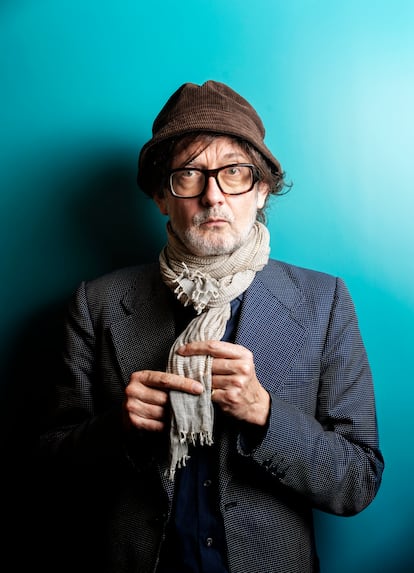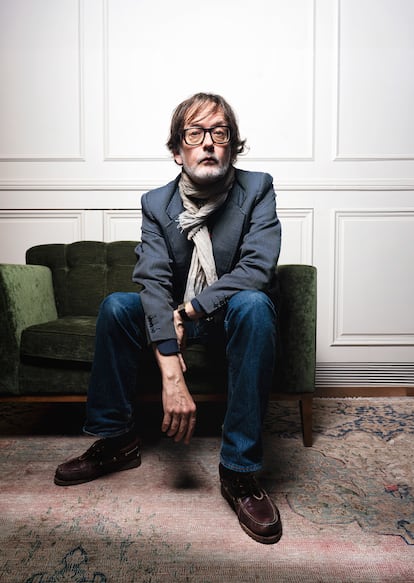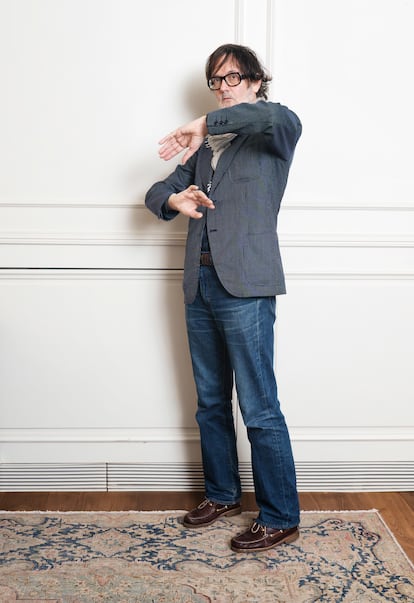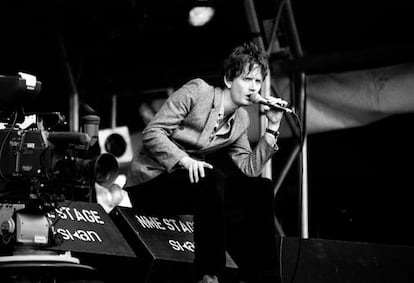Jarvis Cocker, the cursed poet of Britpop: ‘The past is a lie. We all have a completely false official autobiography’
The myopic boy of 1990s English pop music has written a memoir that’s like one of his songs. At 60, the Pulp frontman recounts his dreams of greatness, his ambition, his lack of willpower… and his descent into hell

Jarvis Cocker has a trick. On the not-so-rare occasions when he’s had to act as a TV or radio interviewer, the musician from Sheffield, in the United Kingdom, prepares “no more than 10 questions on four or five different topics” and then lets the conversation flow. If he gets stuck or suffers an attack of stage fright — as he almost did the day he was interviewing one of his heroes, Leonard Cohen — he resorts to one of his prepared questions, even if it’s unimportant.
However, this trick doesn’t work when he’s the one being interviewed. With Cocker, the conversation always seems to flow… but it does so through unexpected channels. Each question that he’s asked opens up a cascade of reflections, anecdotes and memories that he — entrenched behind his horn-rimmed glasses — reels off with humor, parsimony and care.
“I realize that I tend to ramble a lot,” Cocker acknowledges, during his interview with EL PAÍS at a hotel in Barcelona. He’s in town promoting his memoir: Good Pop, Bad Pop. “You ask me specific and direct questions and I give you mile-long answers. But if I’ve learned anything from writing this book, it’s that almost everything is connected, that things are much more complex than they seem and, consequently, that there are no simple answers,” he shrugs.
Good Pop, Bad Pop is the result of several months of digging through his trunk of memories. Literally: in a small attic in the house where the musician lived in London, he stored “an almost incredible number of objects, from packets of gum to bars of soap, notebooks, flyers from clubs, concert tickets, postcards, guitar picks, photos, shirts, toys…”
Cocker began writing about that “insane pile of garbage that accumulated over the years” because he became convinced that, in some sense, it contained the essence of his own story. And the story of his band, Pulp. “It started as a childhood project, the vehicle to become the only thing I really wanted to be: a pop star. [I wanted that since] I was about 13 years old. I hadn’t even learned how to play the guitar yet!”

This projection of his adolescent fantasies became a somewhat precarious musical project a little later, for which he sought “accomplices.”
“My model was always The Beatles. Pursuing a career as a soloist seemed to me an infinitely more boring option.” Pulp continued to exist for Cocker even in the years when it was a band without records, without concerts and with hardly any rehearsals… and with a leader entangled in years of indolent bohemianism in Sheffield, or studying art “without the slightest conviction” in London.
Between 1978 and 1993, the group endured a very long journey through the desert. In 1994, however, they finally got on the radar, with a brilliant and very timely album, His ‘n’ Hers. A year later, this would be followed by Different Class, which took the world by storm. From one day to the next, Cocker went from being an underground artist to performing on the frontlines of music. The world discovered a formidable writer of narrative songs, with the British manners of a Ray Davies, or the humor and everyday magic of a Robyn Hitchcock. What’s more, the lanky, short-sighted guy with an impossible haircut also turned out to be a beast on stage — an unprecedented cocktail of theatricality, exquisiteness, authenticity and charisma. If Damon Albarn and the Gallagher brothers were the figureheads of the “Britpop” revolution, Cocker was its cursed poet and shadow leader.
This success was the prelude to what Cocker now describes as the “most disconcerting” years of his life… the period in which he fulfilled his childhood dreams of world domination and ended up becoming, he explains, a changed man: “Not necessarily a better man. I hope [I didn’t become a] complete idiot… but I was definitely a suspicious, anguished, vain guy.” Fame and success, he admits, were very bad for him. “When I imagined — at the age of 14 — what my life would be like as soon as I became a pop star, I assumed that I wouldn’t live in a house, but in a luxury hotel, with a butler, without sheets to change or clothes to wash. I would spend the entire day lying in bed watching episodes of Batman.”
That dream came true after the success of Different Class. “During the year I spent in New York alone, [I was] dedicated full-time to being a star. It was horrible.”
These days — while writing the sequel to Good Pop, Bad Pop — Cocker is wondering how he’s going to manage to describe that descent into hell. The already-published book covers a much earlier period: “From my childhood in Sheffield, in a modest home, to the years when I lived in an abandoned factory, before moving to London.”

The book was supposed to be something else. “A long and, I suppose, quite boring dissertation about my creative processes. At first, I thought I would call it This Book is a Song.” He had conceived it as a work “with its intro, its first verse, its bridge, its chorus, its second verse.” He dedicated almost two years of “slow and inconsistent” work to it. “That’s because I’m a tortoise. I almost always finish what I start… but at my own pace, without rushing.”
Mónica Carmona, his literary agent, got him “a magnificent contract” at a book fair. “It was enough for her [to provide just] a couple of paragraphs in which I explained my idea, which was very vague. When she returned from the fair, she told me: ‘Jarvis, we’ve sold your book. Now, you’re going to have to write it.’ So I got to work, because she believed in me and I didn’t want to disappoint her.”
In 2018 — as soon as he finished promoting his album Room 29, a collaboration with Canadian musician Chilly Gonzales — Cocker focused on writing what was supposed to be called This Book is a Song. But, despite everything, he couldn’t get started. “After several months of work, they assigned me an editor and she — with a brutal honesty that surprised me greatly — told me that almost nothing I had written was useful. Only a very brief part [was usable]: the chronicle of the day when I decided to empty my attic and began to tell the story of some of the objects I had kept in it. The editor told me that she found that interesting: ‘Forget about the initial idea, it’s the garbage that comes out of your storage room that’s really worth it.’ And I listened to her.”
While picking up objects, photographing them and reflecting on what they meant to him and why he had decided to keep them for so long, Cocker discovered something essential. “The past is a lie. We all have a completely false official autobiography that we tell ourselves and anyone who will listen… but it’s nothing more than a lie. It’s the life of the person we would like to be, not of the person we are. When we face the naked facts — in a photo album, an old notepad, or a storage room full of junk — the truth emerges. And, sometimes, it’s disturbing and painful.”
The true story of Jarvis Cocker, told from the perspective of his beloved objects, is perhaps “that of a man with a superstitious and irrational attachment to the past, who keeps bars of soap from his childhood, because it depresses him that the design changes and that the memory of the original packaging is lost.” Cocker has taken on the challenge of showing himself as what he is: a man “with dreams of greatness, who dedicated most of his best years to wasting time… [a man] who always had ambition, but whose willpower and perseverance often failed him.”
Looking back has also helped him to see how deeply rooted music has always been in his life. “If you ask me about my oldest musical memory, I feel that strange tickling in my shoulders and neck again, which I felt when listening to the radio with my mother. [I loved] songs like If You Could Read My Mind, by Gordon Lightfoot. I was so young that I took whatever I was hearing at face value. I really believed that the radio sprites could read my mind, get into my brain. It was an exciting feeling.” More signs that young Cocker had an unavoidable date with destiny? He was born “on September 19, 1963, the day She Loves You went to number one on the British charts.” And his father “left home in 1970, the year The Beatles broke up.” For him, that year meant “the end of innocence.”

His elusive father had once played trombone in a band that also included Joe Cocker. “We had no family relationship, except for the last name.” One Cocker ended up triumphing, while the other soon left music. “I know that my father was mortified by that old story of crossed destinies. If he had stayed at home, perhaps he could have guided me in my first steps with the guitar, which I learned to play alone, with a lack of natural skill that still accompanies me today. Luckily, very shortly after, punk music came to teach me that a couple of chords could be enough, that technique wasn’t the least bit important. [This was a relief], because at 13, I was mortified that I was unable to play Beatles songs.” Neither could his grandfather, who played the organ “only at Christmas and on some birthdays,” or his great-uncle, “who had a band that he played with in tourist towns” in the UK and Germany. His uncle died when he was very young, leaving him “a pair of leather trousers with suspenders that were all the rage in Germany, but which you couldn’t wear in Sheffield, unless you were prepared to be humiliated.”
Cocker attributes his passion for music to his myopia. “I’ve always been very nearsighted, with multiple diopters. The strange thing is that they didn’t detect [this condition] until I was five. Before I got my first glasses, my area of clear vision was reduced to just a [few feet]. The rest was a blurry mass… faces I didn’t recognize, tables and furniture I tripped over, soccer balls I didn’t see coming until they hit me in the face. A hostile universe. [But the world] of sounds, on the other hand, was a clear and friendly universe in which I never stumbled.” The glasses restored balance, but the acoustic universe has had much more weight in his life than the visual one.
In the final stretch of Good Pop, Bad Pop, Cocker addresses a “traumatic” event that ended up changing his life. “I don’t want to [discuss it in this interview], because it’s a dramatic twist and I prefer not to give any spoilers. But I do want to talk about what I learned from that. [The event] taught me to trust my intuition as a storyteller. I surprised myself by observing what was happening around me and turning it into narrative material for the lyrics of my songs. I discovered that reality is an extraordinary source of stories and that it’s not even necessary to transform and embellish them — the brain already selects the essential details for you, those that have captured your attention and will capture the attention of those who listen to you.”
Out of this discovery came several songs with ordinary and accurate names, such as Common People, Babies and Do You Remember the First Time? His memoir Good Pop, Bad Pop also emerged from this reality… a book that wanted to be a song and ended up becoming a fascinating spell to help him recover his memory.
Sign up for our weekly newsletter to get more English-language news coverage from EL PAÍS USA Edition
Tu suscripción se está usando en otro dispositivo
¿Quieres añadir otro usuario a tu suscripción?
Si continúas leyendo en este dispositivo, no se podrá leer en el otro.
FlechaTu suscripción se está usando en otro dispositivo y solo puedes acceder a EL PAÍS desde un dispositivo a la vez.
Si quieres compartir tu cuenta, cambia tu suscripción a la modalidad Premium, así podrás añadir otro usuario. Cada uno accederá con su propia cuenta de email, lo que os permitirá personalizar vuestra experiencia en EL PAÍS.
¿Tienes una suscripción de empresa? Accede aquí para contratar más cuentas.
En el caso de no saber quién está usando tu cuenta, te recomendamos cambiar tu contraseña aquí.
Si decides continuar compartiendo tu cuenta, este mensaje se mostrará en tu dispositivo y en el de la otra persona que está usando tu cuenta de forma indefinida, afectando a tu experiencia de lectura. Puedes consultar aquí los términos y condiciones de la suscripción digital.









































